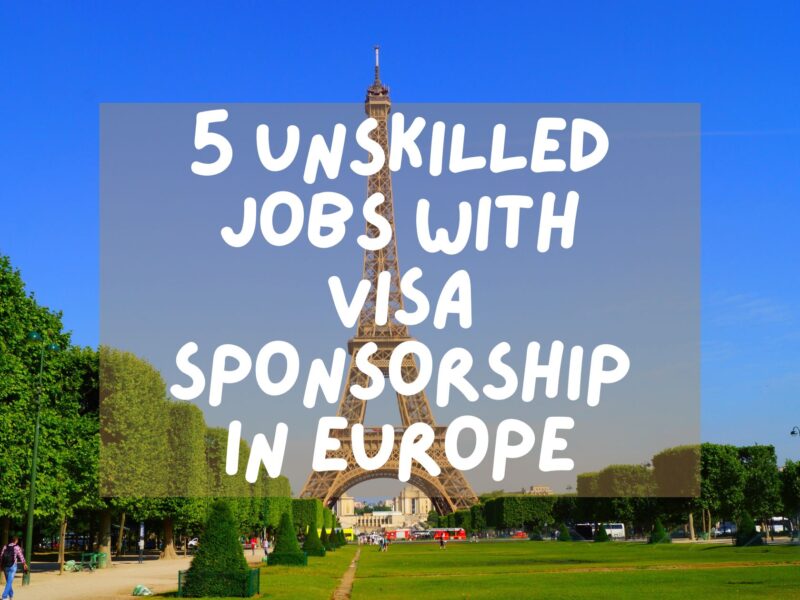Europe is a continent known for its rich history, diverse cultures, and robust economies. For many individuals seeking employment opportunities, Europe presents a wealth of options, including unskilled jobs that often come with the possibility of visa sponsorship. This is particularly appealing for immigrants looking to establish themselves in a new country while gaining valuable work experience. Understanding the landscape of unskilled job opportunities in Europe can be the first step toward building a successful career and life abroad.
Unskilled jobs, often characterized by their lower entry barriers and minimal educational requirements, can be found across various sectors, including hospitality, agriculture, construction, and manufacturing. These positions not only provide essential services but also play a crucial role in supporting local economies. Many European countries are actively seeking foreign workers to fill these roles, which can lead to visa sponsorship, allowing immigrants to live and work legally in their chosen destination.
In this article, we will explore five unskilled jobs that offer visa sponsorship in Europe. We will also discuss entry-level positions available for immigrants, visa requirements, salary scales, application processes, and potential challenges in securing sponsorship. By providing a comprehensive overview, we aim to equip prospective immigrants with the knowledge they need to navigate the job market in Europe effectively.
Entry Level Jobs for Immigrants
1. Hospitality Staff
The hospitality industry is one of the largest employers in Europe, encompassing hotels, restaurants, and event venues. Entry-level positions such as waitstaff, kitchen assistants, and housekeeping staff are in high demand, particularly in tourist-heavy areas. These roles typically require strong communication skills, a friendly demeanor, and the ability to work in fast-paced environments. Many employers in the hospitality sector are open to hiring immigrants and often provide on-the-job training.
Salaries for hospitality staff vary depending on the country and the type of establishment. For instance, waitstaff in popular tourist destinations may earn tips in addition to their base salary, making this a potentially lucrative option. On average, entry-level hospitality roles can offer salaries ranging from €18,000 to €25,000 per year, with opportunities for advancement into supervisory or management positions as experience is gained.
2. Agricultural Workers
Agriculture is a vital sector in many European countries, particularly during peak harvesting seasons. Unskilled agricultural jobs, such as fruit pickers, farmhands, and livestock caretakers, are often available, especially in rural areas. These positions typically require physical stamina, a willingness to work outdoors, and the ability to follow instructions. Many farms and agricultural companies are willing to sponsor visas for foreign workers, particularly during busy seasons when local labor is insufficient.
The salary for agricultural workers can vary significantly based on the type of work and the region. On average, entry-level agricultural positions may offer salaries ranging from €20,000 to €30,000 annually. While these roles may not be the highest-paying, they often come with the benefit of seasonal work, allowing individuals to gain experience and potentially transition into other opportunities within the agricultural sector or beyond.
3. Construction Laborers
The construction industry is another area where unskilled labor is in high demand across Europe. Entry-level positions such as construction laborers, site assistants, and general helpers are essential for various projects, including residential, commercial, and infrastructure developments. These roles typically require physical strength, the ability to work as part of a team, and adherence to safety regulations. Many construction companies are open to hiring immigrants and may provide visa sponsorship for skilled and unskilled labor alike.
Salaries for construction laborers can vary depending on the country, the type of project, and the level of experience. On average, entry-level construction jobs can offer salaries ranging from €22,000 to €35,000 per year. As workers gain experience and potentially pursue certifications in specialized areas, they can advance to higher-paying roles, such as skilled trades or supervisory positions.
4. Warehouse Operatives
With the rise of e-commerce and logistics, the demand for warehouse operatives has surged across Europe. Entry-level positions in warehouses typically involve tasks such as picking and packing orders, inventory management, and shipping and receiving goods. These roles require attention to detail, the ability to work efficiently, and sometimes the use of machinery. Many logistics companies are willing to sponsor visas for foreign workers to fill these essential roles.
The salary for warehouse operatives can vary based on the location and the specific employer. On average, entry-level warehouse positions can offer salaries ranging from €20,000 to €28,000 annually. As workers gain experience and potentially take on additional responsibilities, they may have opportunities for promotions or transitions into management roles within the logistics sector.
Visa Requirements for Employment
To work in Europe, foreign nationals typically need to obtain a work visa, which allows them to live and work legally in their chosen country. Visa requirements can differ significantly between countries in Europe, but common elements include:
- Job Offer: Most work visas require a job offer from a recognized employer in the host country. The employer may need to demonstrate that they were unable to find a local candidate for the position.
- Visa Application: Applicants must complete a visa application form and submit it to the relevant authorities, often accompanied by a fee.
- Supporting Documents: Commonly required documents include a valid passport, proof of qualifications or work experience, a signed employment contract, and sometimes a medical certificate.
- Language Proficiency: Some countries may require proof of proficiency in the local language, particularly for jobs that involve customer interaction.
- Background Checks: Applicants may need to undergo background checks, including criminal record checks, as part of the visa application process.
It is essential for immigrants to research the specific visa requirements for the country they wish to work in, as regulations can vary widely.
Salary Scale for Immigrants
| Job Title | Entry-Level Salary (EUR) | Mid-Level Salary (EUR) | Senior-Level Salary (EUR) |
|---|---|---|---|
| Hospitality Staff | 18,000 – 25,000 | 25,000 – 35,000 | 35,000 – 50,000 |
| Agricultural Workers | 20,000 – 30,000 | 30,000 – 40,000 | 40,000 – 55,000 |
| Construction Laborers | 22,000 – 35,000 | 35,000 – 50,000 | 50,000 – 70,000 |
| Warehouse Operatives | 20,000 – 28,000 | 28,000 – 38,000 | 38,000 – 50,000 |
Application Requirements and Documents
When applying for unskilled jobs in Europe, immigrants must prepare a thorough application package. This typically includes:
- Resume/CV: A well-structured resume that highlights relevant experience and skills. Tailoring the resume to each job application can improve chances of being noticed.
- Cover Letter: A personalized cover letter that explains the applicant’s interest in the position and how their background aligns with the employer’s needs.
- Proof of Qualifications: Depending on the job, applicants may need to provide evidence of any relevant qualifications or certifications, even for unskilled positions. This could include vocational training certificates or proof of previous work experience.
- References: Contact information for professional references who can vouch for the applicant’s work ethic and skills. References from previous employers or supervisors are typically preferred.
- Work Permit/Visa Documentation: If applicable, documentation related to the work permit or visa application should be included. This may consist of a copy of the job offer, proof of application submission, or any other relevant documents required by the immigration authorities.
- Language Proficiency Certificates: If the job requires proficiency in the local language, applicants may need to provide proof of language skills through standardized tests or certificates.
It is crucial for applicants to ensure that all documents are accurate, complete, and professionally presented. Many employers appreciate a well-organized application, which can reflect positively on the candidate’s attention to detail.
Employment Websites to Find Opportunities
Several online platforms cater specifically to job seekers in Europe, making it easier for immigrants to find unskilled job opportunities. Some of the most popular employment websites include:
- EURES: The European Employment Services (EURES) platform provides job listings across Europe, particularly for cross-border job seekers. It offers a wealth of resources, including information about living and working in different European countries.
- Indeed: A widely used job search engine that aggregates listings from various sources, including company websites and job boards. Users can filter searches based on location, job type, and salary, making it a valuable tool for finding unskilled job opportunities.
- LinkedIn: While primarily a professional networking site, LinkedIn also features a robust job search function. Job seekers can create profiles, network with industry professionals, and apply for jobs directly through the platform.
- Monster: This global job board features a wide range of job listings, including unskilled positions across Europe. Monster also provides resources for job seekers, such as resume writing tips and career advice.
- Glassdoor: Known for its company reviews, Glassdoor also offers job listings and salary information. This platform allows job seekers to gain insights into company culture, interview processes, and employee experiences, which can be beneficial when deciding where to apply.
- Local Job Boards: Many countries have local job boards that cater specifically to their job markets. Researching these resources can uncover additional job opportunities that may not be listed on larger platforms.
Step-by-Step Guide to Applying for Jobs
Navigating the job application process can be daunting for immigrants, but following a structured approach can increase the chances of success. Here’s a step-by-step guide to applying for unskilled jobs in Europe:
- Research Job Opportunities: Start by exploring various job boards and company websites to identify positions that match your skills and experience. Make a list of potential employers and job openings that interest you.
- Tailor Your Resume and Cover Letter: Customize your resume and cover letter for each application. Highlight relevant experience, skills, and accomplishments that align with the job description. Use keywords from the job posting to increase the chances of your application being noticed.
- Prepare Required Documents: Gather all necessary documents, including your resume, cover letter, proof of qualifications, references, and any visa-related documentation. Ensure that all documents are formatted professionally and free of errors.
- Submit Your Application: Follow the application instructions provided by the employer. This may involve submitting your application through an online portal, via email, or in person. Ensure that you meet all deadlines and provide all requested information.
- Follow Up: After submitting your application, consider sending a polite follow-up email to express your continued interest in the position. This demonstrates initiative and can help keep your application top of mind for the employer.
- Prepare for Interviews: If selected for an interview, research the company and practice common interview questions. Be ready to discuss your qualifications and how you can contribute to the organization. Dress professionally and arrive on time for the interview.
- Negotiate Offers: If you receive a job offer, carefully review the terms and consider negotiating salary and benefits if necessary. Research industry standards to ensure that the offer is competitive.
Potential Challenges in Securing Sponsorship
While many employers in Europe are open to hiring foreign workers, securing visa sponsorship can pose challenges. Here are some potential hurdles that immigrants may face:
- Complex Visa Processes: The visa application process can be complex and time-consuming. Each country has its own regulations and requirements, which can vary significantly. Immigrants must be diligent in understanding the specific requirements for their chosen destination.
- Employer Reluctance: Some employers may be hesitant to sponsor visas due to the perceived administrative burden or the need to prove that no local candidates are available for the position. This can make it challenging for immigrants to find opportunities that offer sponsorship.
- Language Barriers: Proficiency in the local language is often a requirement for many jobs, even in unskilled positions. Non-native speakers may face challenges in communication, which can affect their job prospects.
- Cultural Differences: Adapting to a new work culture can be challenging for immigrants. Understanding workplace norms, expectations, and communication styles is crucial for success in a new environment.
- Recognition of Foreign Experience: Some employers may not fully recognize or value foreign work experience, making it essential for immigrants to effectively communicate their skills and qualifications during the application process.
Conclusion
Europe offers a range of unskilled job opportunities for immigrants seeking visa sponsorship. From hospitality and agriculture to construction and warehouse roles, there are numerous avenues for individuals to build their careers while experiencing life in a new country. Understanding the visa requirements, salary scales, and application processes is vital for successful job hunting.
By utilizing online resources, tailoring applications, and preparing for interviews, immigrants can enhance their chances of securing employment in Europe. While challenges may arise, the rewards of working in a diverse and dynamic environment make the effort worthwhile. With determination and the right strategy, foreign workers can successfully navigate the European job market and embark on a fulfilling career abroad.










